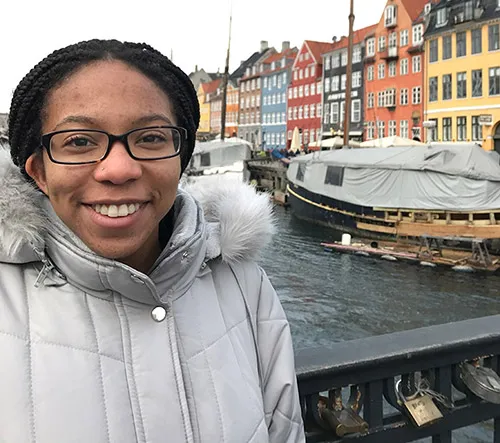Sociology and Anthropology - Beyond the Classroom
Beyond the Classroom
Sociology and Anthropology

Thanks to study abroad and internship experiences, Berlin became a second home of sorts to sociology and anthropology major Jessi McNeill ’18.
During the spring 2017 semester, the Connecticut native studied in Germany’s capital through the Council on International Educational Exchange’s open campus program. “I was hesitant because I knew nothing about the culture or language, but it was one of the best decisions I’ve ever made,” she said. “I’m grateful that I ended up picking Berlin out of every place I considered.”
The 18-week program offered a course sequence focusing on global and community health, allowing McNeill to indulge her growing interest in medical anthropology by taking classes on community and public health, comparative health care systems and food, nutrition and culture.
“I love looking at how culture and health impact each other,” she said. “Often culture is not considered when looking at health or medical practices, especially in the U.S. because we’re really science-centered. Our scientific way of looking at health care is a cultural standpoint in and of itself.”
McNeill had just returned from her semester abroad when she was invited to intern with the Berlin-based Young Leaders for Health, helping to organize the nonprofit’s summer conference. Less than three weeks after returning to the U.S., she once again boarded a plane for Germany.
Throughout the two-month internship, McNeill played a leadership role in planning and implementing the conference, which focused on interdisciplinary approaches to global health challenges, politics and diplomacy by combining workshops and lectures with a World Health Assembly simulation and a design thinking lab. She facilitated teleconferences with subcommittees, planned travel for speakers, published blog posts, transcribed interviews and co-facilitated a session at the conference, which attracted about 130 participants from nations as diverse as Iraq, New Zealand and the Sudan.
“The purpose of the conference was to get young health professionals to network, connect and problem-solve for global issues, so it was really cool to have participants from all over the world,” McNeill said. “It was truly an international conference.”
McNeill noted that her studies in sociology and anthropology were an asset in creating and executing the conference. “The ability to interact with people is incredibly important. A lot of people don’t understand how much our culture and society shape who we are and shape the world around us,” she said. “Having that background really helped me to understand the conference participants and organizing committee. I’m grateful that I was able to go into this experience from the perspective that I have. My major lent a special lens for the entire internship.”